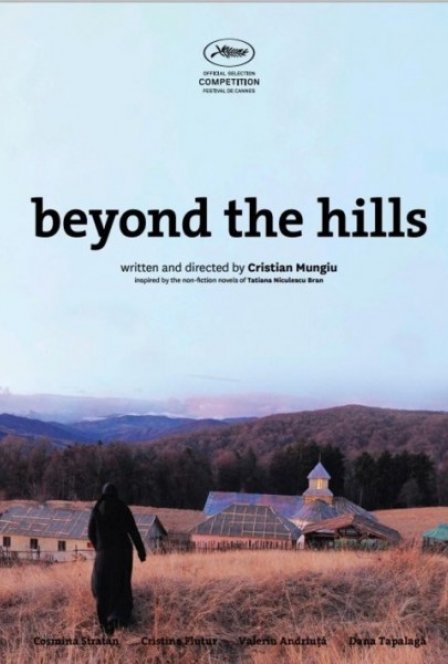Coming out nearly five years after his Palme D’Or-winning Four Months, Three Weeks, and Two Days, Christian Mungiu’s Beyond the Hills seemed ripe for disappointment — not only amidst the growing anticipation for this follow-up to his hit debut, but also, given the international cache of the Greek New Wave via films such as Dogtooth, Attenberg and Alps, the Romanian New Wave’s fallen status to second place on the list of Hippest New Waves in Horribly Depressing Countries. But time has shifted neither Mungiu’s strategy nor his focus; his new film has a ripped-from-the-newspaper feel both in its sociopolitical relevance and its gripping emotional immediacy. Like Four Months, Beyond the Hills is about a shocking true event that exposes the moral hypocrisies of modern Romania, while also tying into broader, global concerns — this time religion and faith instead of abortion.
Set in the Romanian countryside, Beyond the Hills tells the story of two young women, Alina (Cristina Flutur) and Voichita (Cosmina Stratan), who grew up in an orphanage together and who eventually became lovers. For some unexplained reason, the two separated — Alina went to live in Germany while Voichita moved to a small Orthodox convent in the hills of Romania — but they planned to reunite when they had enough money to move away together. Mungiu begins the film with their reunion, only for us to discover that Voichita has become devoutly religious in the interim and no longer wishes to leave the convent. The film deftly explores the couple’s navigation through this murky, unmarked territory where Alina’s burning passion is met by Voichita’s stoic dogmatism, yet despite her repeated rebukes, it is clear that Voichita still loves and cares for Alina, even going so far as repeatedly convincing the head priest and nun, whom she creepily refers to as “Daddy” and “Mommy”, to allow her to stay despite her lack of faith and predilection to violent outbursts.
What makes Beyond the Hills a great film, rather than simply a retelling of an already fascinating story, is the organic way Mungiu allows everything to unfold — from Alina and Voichita’s backstory to the convent’s increasingly dangerous, archaic ways — which continually leaves things in a morally and narrative grey area without ever veering towards a a judgmental or accusatory tone. The film’s central dichotomy, that of blind faith vs. impassioned disbelief, is further complicated by Voichita’s refusal to acknowledge her past, both directly to Alina and indirectly to the head priest or nun via confession. This pervasive disconnect between the now pious Voichita and the truth of her past sets in motion a series increasingly detrimental misunderstandings between Alina, who cannot accept the new Voichita’s refusal to acknowledge her love, and other members of the convent who begin to see her erratic violent and emotional outbursts as a sign of her being possessed.
The skillful handling of such radical yet delicate material in the film’s final act is quite a sight to see. Mungiu strikes the perfect balance of von Trierian-style melodrama and fly-on-the-wall realism which, along with the brilliant first-time performances by both Flutur and Stratan (who shared Best Actress honors at last year’s Cannes Film Festival) creates a vibrant intensity and an ever-increasing sense of tension. Beyond the Hills is the rare film that is equally adept at social commentary, character-building, and, particularly closer to the end, creating both suspense and an unsettlingly strange and brooding atmosphere. Like the best offerings from its country over the past decade, it paints a harrowing picture of life in modern Romania with a raw, unfiltered realism, but does so through the prism of universal, humanistic themes and its remarkably compassionate yet unflinching portrayal of characters simply trying to survive as best they can. It’s a punch in the gut, but a fascinating and rewarding one that leaves a mark even after you catch your breath.

